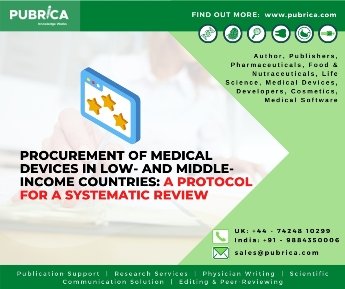
Recent technologies and future perspectives in cancer therapies
August 16, 2021
Procurement of medical devices in low- and middle-income countries: a systematic review help
August 23, 2021In brief
The National Library of Medicine’s Medical Subject Headings (MeSH) thesaurus is a controlled and hierarchically ordered vocabulary. It’s a tool for indexing, cataloguing, and searching biomedical and health-related data. The topic headings in MEDLINE/PubMed, the NLM Catalog, and other NLM databases are included in MeSH. Each citation in an article is linked to a collection of MeSH words that define the citation’s content. You will target your search and find more important citations using MeSH entry terms instead of keywords (1).
Introduction
The MeSH database is a medical vocabulary resource maintained by the National Library of Medicine. It organises and defines the hierarchy of terms used in MEDLINE to describe biomedical data. When you type your definition words into MeSH, you’ll get a list of other medical synonyms as well as suggestion on how to search PubMed for these terms. Since simple search terms only refer to words in the paper’s database record, not the full text, it’s critical to look for index terms. Human indexers keep track of all related words, even if they aren’t in the title or abstract of a paper.
Indexed terms can also include several entry terms. MeSH, for example, indexes the definition of “heart attack” as “myocardial infarction.” You risk losing articles that use the word myocardial infarction if you only search for “heart attack.” Using the index words will help you find articles that use the terms “heart attack” and “myocardial infarction.”Find good MeSH terms, look up a record for a paper you know you’ll use in your review and look through the assigned MeSH terms to see if any are relevant(2).
Guidelines for MeSH terms
The NLM Customer Support Center covers a wide range of topics related to NLM products. You may also submit a journal request for a modification or addition to MeSH vocabulary by clicking the Write to the Help Desk button. Please read the instructions below to ensure that your request is processed properly.
Follow the steps below to help us expedite your request:
- Please click: To open a new window or tab with an online request form, write to the support desk.
- Enter one of the following as the topic of your request in the Subject box:
- To propose a new MeSH term or heading, write “New MeSH term” in the subject line.
- “MeSH word update” for improvements to MeSH terminology.
- “MeSH factual mistake” is used to correct a MeSH definition or context.
- “MeSH tree update” for corrections or improvements to the MeSH tree hierarchy.
- None of the above options? You are free to choose your subject.
- In the Description box, describe the change or addition to MeSH and any relevant additional details (e.g., the reason for your suggested change; citations to back it up).
- Please keep in mind that providing your email address will notify you of our actions (3).
Table: 1 Search strategy

Advanced PubMed searching with MeSH
The regulated vocabulary or topic heading list of the National Library of Medicine (NLM) is MeSH. Indexers, who are subject analysts who keep the PubMed database up to date, use it to represent the subject content of journal articles when they are published. Any indexed paper is usually defined by 10–12 MeSH terms chosen by indexers. You won’t have to worry about word variants, word endings, plural or singular forms, or synonyms when using MeSH words. You may use MeSH functionality to customise your searches with subheadings and, if desired, to tag specific MeSH words as the primary focus of the references retrieved.
MeSH terms with subheadings
Tap the drop-down menu beside the search box on the main PubMed page to access MeSH words. When you enter a phrase, the system will show you a list of subject headings with meanings from which to choose. To get started, select a MeSH term that interests you. A new window will appear, with the word you choose at the top and a list of subheadings below. You may select separate subheadings to explain a specific feature of a topic from this display (diagnosis, prognosis, treatment etc.). To narrow down your search results, use as many subheadings as you want. Your search results will be more if you select more subheadings.
Major MeSH terms & Explosion of MeSH terms
You’ll see a box below the subheading list where you can “Restrict Search To Major Topic Headings Only.” This will limit the search results so that the MeSH word you’re looking for is the primary focus of the references found.
A hierarchical arrangement of terms relevant to the MeSH term you chose can also be found on this page. This graph depicts the relationship between your word and other MeSH terms. MeSH terms in PubMed are immediately expanded to include all narrower terms in the hierarchical list. If you don’t want the more precise subject headings indexed below your term in the list, check the box next to “Do Not Explode this term.”
Using the “History” tab and combining search sets, you can combine MeSH terms with connector words “AND,” “OR,” and “NOT,” just as you can with simple searching.
Viewing MeSH Headings in a relevant reference
If you’ve found the perfect reference in PubMed, you may want to reconsider your search strategy by looking at how this paper was indexed with MeSH terms to find other related (and relevant) references. You may also use the “Related Papers, Links”feature (4). When viewing a reference in PubMed, press the drop-down menu beside Show to see the MeSH words for that reference. Choose the “citation” format, and a list of MeSH words selected by indexers will appear. Revise your search strategy by searching the MeSH database for additional MeSH keywords.
Table: 2 Viewing MeSH Headings in a relevant reference

PubMed’s Clinical Queries for quick searches for clinical problems
Clinical research Queries in PubMed are pre-programmed search methods for searching PubMed for clinical issues. From the main PubMed tab, choose Clinical Queries from the blue left sidebar. Choose one of the three possibilities. You can restrict your search by aetiology, diagnosis, treatment, or prognosis by searching by Clinical Study Category. Look for Systematic Reviews is a search engine that will help you locate systematic reviews, meta-analyses, clinical trial reviews, evidence-based medicine, consensus growth conferences, and recommendations.
Automatic email updates of searches/saving search strategies
You can save your search strategy (to run at a later time) and set up automatic updates of your search strategy using PubMed’s NCBI feature. This is an excellent service, particularly if you’re conducting a literature search as part of a larger project. You can save the search strategy for each PubMed search so that you can run it again at your leisure, or you can have the search run for you on a regular, weekly, or monthly basis and have the results emailed to you(5).
Conclusion
If you’ve finished your search, you’ll need to report your findings in your article’s Methods portion. Keywords explain the medical principles in papers in the medical literature, much as in a typical study report. The purpose is reproducibility so that someone else might replicate the concepts and get the same results. They offer numerous advantages to database creators, indexers who cross-index scientific papers, and users by facilitating access to sources. As a result, writers must choose correct keywords and conform to Medical Subject Headings (MeSH). Many keywords conclude that medical authors should be taught how to use MeSH terminology correctly in their study and subsequent publications (6).
References
- Salehinejad, Simin, Parya Jangipour Afshar, and Vahidreza Borhaninejad. “Rumor surveillance methods in outbreaks: A systematic literature review.” Health Promotion Perspectives 11.1 (2021): 12.
- Richter, Peggy, and Hannes Schlieter. “Paving the Way for Patient Pathways: Synthesising a User-Centered Method Design with Results from a Systematic Literature Review.” Proc 15th Int Conf on Wirtschaftsinformatik. 2020.
- Brody, Stacy. “The Unifed Medical Language System: A Scoping Review of its Use in Research.” (2020).
- Jacobsen, Kathryn H. Introduction to health research methods: A practical guide. Jones & Bartlett Publishers, 2020.
- Brown, Roy E. “Evidence-Based Practice Question Development & Search Checklist.” (2020).
Canu, Romain, et al. “Curvature-based interface resolution quality (IRQ) indicator to assess simulation accuracy.” Atomisation and Sprays 30.1 (2020).
